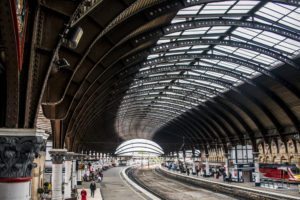
Union leaders said that they hoped to “find a solution together” with the government to end the long-running dispute over pay, as a train drivers’ strike brought many services around Great Britain to a complete halt on Wednesday.
Delegates who had remained at the Conservative party conference for Liz Truss’s speech were unable to travel by train with Avanti, CrossCountry, Chiltern and West Midlands, which were among the 12 operators left without drivers.
Motorways and urban roads into several major cities were heavily congested as major train operations across Great Britain were all but closed down by the 24-hour Aslef strike.
The transport secretary, Anne-Marie Trevelyan, had appeared to hold out an olive branch to unions in recent days and told Conservative members in a conference speech on Tuesday “there is a deal to be done”, adding that “the very last thing the country needs right now is more damaging industrial disputes”.
She said she wanted employers to bring forward positive proposals, and told unions: “Let’s find a landing zone we can all work with.”
Despite the marked change in tone from her predecessor, Grant Shapps, unions said there had yet to be any substantive move in talks with the rail industry.
Aslef’s general secretary, Mick Whelan, said only the government could solve the dispute but added that he had found Trevelyan welcoming and listening, and looked forward to trying to “find a solution together”.
At a picket line outside the closed Euston station on Wednesday, Whelan told the PA news agency he would continue to talk but feared Truss was not getting “the mood music of the country” over the cost of living crisis and need for pay rises. He said: “Only the government can correct this and we ask them to do so.”
Members of the TSSA union at many rail operators are also either on strike or taking continuous action short of a strike, including an overtime ban. Its general secretary, Manuel Cortes, said the TSSA had had no talks at all with train operators since July. He said they would welcome a “new broom” but Trevelyan “needs to be proactive and committed, unlike her predecessor, who was an obstacle to progress”.
The RMT union said it was still in talks but there was no prospect of this Saturday’s strikes by its members at Network Rail and 14 train operators being called off. About 20% of normal services are expected to run, mainly between 7am and 7pm.
A source close to the talks said it was clear the situation was “in flux backstage” but that there was no still change in the industry’s official negotiating position.
Public opinion is more supportive than opposed to the unions and strikes, according to recent Ipsos UK polling. Further backing is coming from music stars who are recording a song in support of rail workers. Members of Primal Scream, Dexys Midnight Runners and the Jesus and Mary Chain have come together to work on a song, entitled Enough Is Enough, which will be released at the end of the month.
Kevin Rowland, the lead singer of Dexys, said: “RMT has been leading the way on behalf of working people and now other unions are joining the fight against low pay and this government that is trying to screw working people into the ground.”
Interviews by the RMT general secretary, Mick Lynch, a viral sensation, will feature on the track. He said: “It shows the growing amount of support for social justice and the fact that trade unions are the only thing that stand in the way of endless austerity and poverty.”
Data from traffic tracking firms showed travellers had switched to cars, with Waze reporting speeds of 8mph on stretches of the M25, A40 and M60, while TomTom said congestion levels had risen significantly from last week in cities including Liverpool, Manchester and Sheffield.
The Department for Transport said: “We urge union bosses to reconsider this divisive action and instead work with their employers, not against them, to agree a new way forward.”
Read more:
Rail unions hope to find solution to pay dispute ‘together’ with UK government





